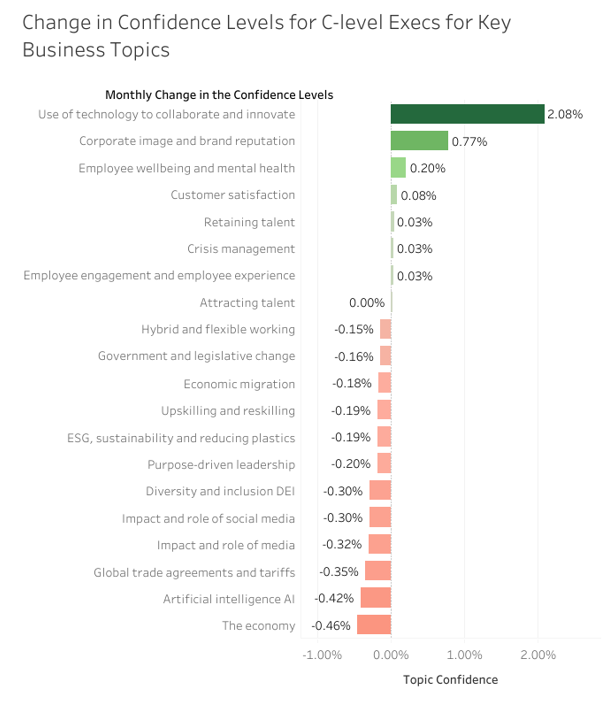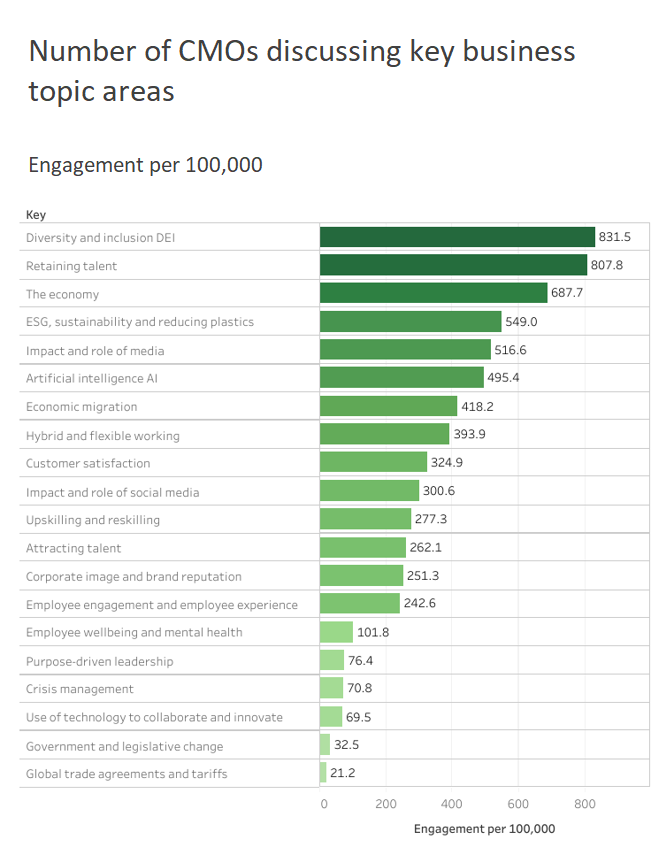CMOs To Drive A Three-Pronged Recession Busting Approach
The latest results from the Worldcom Confidence Index (WCI) show that CMOs’ declining confidence in the economy may be driving a three-pronged approach to beat the recession.
*The Worldcom Confidence Index (WCI) is the first AI-driven ‘living’ global market research, tracking the topics that over 80,000 CEOs and CMOs are commenting on online. The AI-fuelled tracker is updated monthly and is drawn from an active sample of over 100,000 C-Suite executives. It tracks data for two roles, six regions, 42 countries and 11 industry sectors. It identifies the levels of engagement with business topics and how much the level of confidence for each topic has changed. It is the first global study of this type to use AI supported data capture.
.
Worldcom Confidence Index shows CMOs’ are ready to drive a three-pronged approach to beat the recession
The latest results from the Worldcom Confidence Index (WCI) show that CMOs’ declining confidence in the economy may be driving a three-pronged approach to beat the recession. CMOs’ confidence in the economy saw the largest fall between June and July, down 0.46%. However, other results from Worldcom’s global tracker point to how CMOs are planning to overcome the challenges of the looming global recession. The three-pronged approach covers:
- Investing in brands
- Improving the customer experience (CX) by improving the employee experience (EX)
- Using technology – but not necessarily AI – to innovate and collaborate.
Brands as a ‘recession protector’
Brands are seen as value enhancers for businesses because they build consumer trust that the product or service will deliver what they need and is worth a premium. While CMOs are clearly concerned about the economy, they seem to see their brands as the way to sustain value in the recession. Confidence in corporate image and brand reputation saw the second largest increase over the previous month – up 0.77%.
Improving CX from the inside out
Forrester’s Global Marketing Survey predicted that CMOs, who are typically seen as owners of the brand, would begin to influence or control both Customer Experience (CX) and Employee Experience (ES) because of the impact each has on the brand and vice versa. The predictions were made before the war in Ukraine and the global impact this had. So, what does the latest data from the WCI show in terms of CMO confidence for CX and EX? Confidence in customer satisfaction saw the fourth largest increase over last month. Confidence in EX also rose but less than half as fast. Highly engaged employees are vital for delivering an exceptional customer experience and CMOs clearly see that sustaining success through the recession must start with employees.
Technology as a source of marketing innovation – but where does AI fit?
While CMOs may be using the brand as the first line of defense, they seem to be turning to technology to deliver marketing innovation. Confidence in the use of technology to innovate saw the biggest increase month on month. Confidence rose by 2.08%, almost three times as fast as confidence in brand reputation. However, confidence in Artificial Intelligence (AI) saw the second biggest fall – down 0.42% – despite high levels of engagement in the topic[i] – suggesting CMOs have not yet worked out how to use AI to deliver the disruptive approach they need to succeed.
The Worldcom Confidence Index is the world’s most extensive monthly study of what the C Suite is talking about. And it is the only global study that shows the change in confidence across a range of important business topics. This extensive data is now available via an interactive online portal and can be filtered by geography, industry and role. Explore the archive and updates of WCI data online. Our Worldcom partners in 115 cities are ready to provide even more local context. Contact Todd Lynch to start the discussion.
Artificial Intelligence provides unrivalled view of trending topics and leaders’ confidence levels in addressing them
The Worldcom Confidence Index is the world’s largest monthly study of what the C Suite is talking about. And it is the only global study that shows the change in confidence across a range of important business topics. It is able to operate at this scale, and in nine different languages, because the data is captured using a breakthrough approach powered by artificial intelligence (AI). This allows us to discover the issues that concern leaders – and their confidence levels in addressing them.
The chosen research firm, Advanced Symbolics Inc. (ASI), has developed a patented method of building representative samples and then capturing information with their AI tool. By using ASI’s AI tool, we have produced a truly global perspective on the business issues of the moment and where they rank in terms of leadership attention. We’ve also calculated the confidence index level for every topic and audience and identified how this changes for 42 countries around the world. This is incredibly valuable insight because it not only represents what leaders are talking about, rather than responses to questions, but also shows their confidence or concern in addressing each topic. It means you can compare your own thoughts with more than 100,000 of your global peers.


